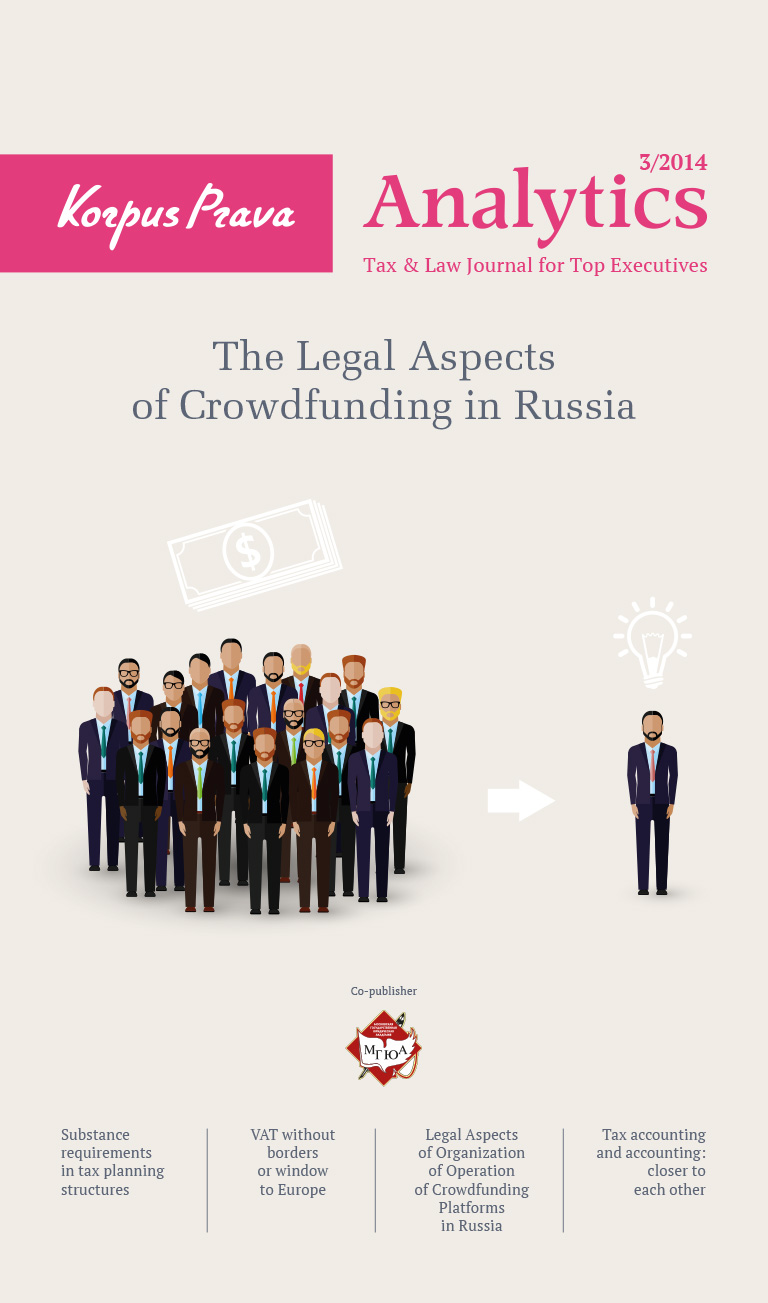- Cyprus Citizenship Scheme for Foreign Investors
- Squeezed But Pleased: Taxation of Passive Income in the European Union
- VAT Without Borders or Window to Europe
- Legal Aspects of Organization of Operation of Crowdfunding Platforms in Russia
- Substance Requirements in Tax Planning Structures
- “Deposit Splitting” of Individuals. Legal Civil and Criminal Aspects
Estonia: European Oasis for the Cryptocurrency Market
Estonia is considered an advanced country in the IT-field. In recent years, it has become one of the most successful European countries in the business sphere, mainly due to IT-technologies and its innovative model of e-government. Any businessman may get an e-resident card to access all e-services provided by state institutions, including registers, bank services, taxation, etc. The tax burden is bearable, as companies have 0% income tax, and there is no need to establish the charter capital at once upon company’s incorporation.
Apart from other businessmen, these conditions also attract various cryptocurrency-related start-ups. A significant number of successful ICO-projects were implemented in Estonia, and even the government showed its intention to issue its own cryptocurrency EstCoin. Unfortunately, president of the European Central Bank criticized such intentions and added that no EU member state shall issue its own cryptocurrency.
On October 22, 2015, European Court of Justice declared bitcoin an alternative means of payment exchange transactions with which shall be exempt from VAT.[1] Consequently, cryptocurrency in Estonia is VAT-free and ICO-projects are exempt from any taxation. Therefore, funds raised with ICO are exempt from income tax until the dividend distribution on such project.
As for personal income tax charged on client’s funds, Estonian companies bear no such liability. Thus, it is the client that is held liable for payments of income tax on stock exchange income. If a company’s clients are residents of Estonia, they should file returns and pay income tax on their own in accordance with Estonian tax rates. If their clients are non-residents of Estonia, then stock exchange income is subject to taxation in their country of residence.
When working with clients, one should pay close attention to money transfers to off-shore banks, as such transfers are subject to taxation at 25% tax rate (it is better to avoid such transactions). According to the Estonian law, an off-shore bank is a bank which is located in the country with either no income tax, or its rate being less than 1/3 of income tax in Estonia (at the moment, less than 7%).
See https://www.riigiteataja.ee/akt/129122016034 (text in Estonian) for the list of countries which are not qualified as off-shore, despite requirements to income tax.
Transactions with cryptocurrency in Estonia were tarnished by the judgement of the State Court[2] dated April 11, 2016 for the case of the Dutch entrepreneur trading cryptocurrency in Estonia vs. Estonian state. As a result, the entrepreneur lost the case, and administrative board of the State Court ruled that cryptocurrency trading is a business activity governed by the law on money laundering or terrorist financing, and state supervision.
This court practice did not undermine any interest towards cryptocurrency in Estonia. For example, this year foreign investors funded the project of mining-farms on the rented territory of the second largest energy supplier in Estonia, where they located a full park of containers for cryptocurrency mining.
The revised law on money laundering or terrorist financing based on Directive (EU) 2015/849 of the European Parliament and of the Council[3] became effective in Estonia at the end of 2017. The new revised law introduces the term virtual value to replace a general term alternative means of payment. This term covers cryptocurrency, clarifies its meaning and allows all interested parties to legally engage into circulation (trading, exchange, investing) having the relevant regulatory license. According to the law, virtual value is value in a digital form, which may be transferred, kept or sold, and accepted by individuals and legal entities as a means of payment, but which is not deemed a legal means of payment or money of any state.
Based on the new law, persons engaged into cryptocurrency circulation should get a relevant license, which is regulated by the data office on money laundering. The Law “On Money Laundering or Terrorist Financing” provides for two key types of cryptocurrency-related licenses:
- according to paragraph 2, part 1, clause 10 – service of virtual currency exchange for fiat currency
and
- according to clause 11 – service of virtual currency wallet.[4]
The service license for virtual currency exchange for fiat currency makes it possible to provide services of virtual currency exchange for fiat currency and vice versa. The license for the service of virtual currency wallet makes it possible to provide services of virtual wallet to clients, i.e. cryptokeys used for saving or transferring virtual currency are created or held for the client.
Persons that received such licenses are entitled to provide services of exchange, circulation, transfer and holding of cryptocurrency with no territorial limitations, i.e. all over the world. One of the key requirements for getting such licenses is the development of inner company procedures in accordance with AML and KYC principles. The term for consideration of a license application is up to 30 calendar days.
Given that activities in the cryptosphere in many countries are not clearly regulated, and in some countries are even deemed illegal, licenses issued to Estonian regulators are in great demand. It shows serious, transparent and legal nature of activities. For most clients it serves as a determining factor, because crypto-hype sparked activities of frauds that tend to take advantage of people’s trust by offering various get-rich-quick schemes.
[1]http://curia.europa.eu/juris/document/document.jsf?text=&docid=170305&pageIndex=0&doclang=en&mode=req&dir=&occ=first&part=1&cid=604646
[2]https://www.riigikohus.ee/et/lahendid?asjaNr=3-3-1-75-15
[3] https://publications.europa.eu/en/publication-detail/-/publication/0bff31ef-0b49-11e5-8817-01aa75ed71a1/language-en
[4] https://www.riigiteataja.ee/en/eli/ee/Riigikogu/act/521122017004/consolide
Your subscription to our journal will definitely boost the efficiency of your specialists and downsize your expenses for consultants.
The journal is available free of charge in the electronic version.
Free Download

